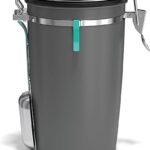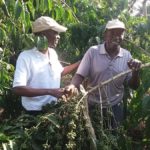Are you looking for a simple way to make a positive difference in the world with your daily coffee routine? In this blog post, we’ll explore five compelling reasons why making the switch to Fair Trade coffee today can benefit both communities and the environment. Join us as we delve into the transformative power of choosing Fair Trade coffee for a more ethical and sustainable coffee experience.
Supporting Fair Wages
Fair Trade coffee is not just a buzzword in the world of ethical consumerism; it represents a concrete way to support farmers and their communities by ensuring fair wages and sustainable practices.
What is Fair Trade Coffee?
- Fair Prices: Fair Trade guarantees that farmers receive a fair price for their coffee beans, ensuring they can cover production costs and provide for their families.
- Community Development: By paying fair wages, Fair Trade empowers farmers to invest back into their communities through education, healthcare, and infrastructure.
The Impact of Fair Trade Coffee
- Farmer Empowerment: Brands like Starbucks Fair Trade Coffee work directly with farmers to provide training and resources, empowering them to improve the quality of their crops and increase their income.
- Environmental Sustainability: Fair Trade practices often go hand in hand with environmental stewardship, promoting eco-friendly farming methods that preserve biodiversity and protect natural resources.
Supporting Fair Wages with Your Coffee Choice
When you choose to buy Peet’s Fair Trade Dark Roast over conventional coffee, you are not just getting a great cup of coffee; you are also making a conscious decision to support fair wages for coffee farmers.
- Taste: Fair Trade coffee is known for its high quality and rich flavors, making it a win-win for both your taste buds and your conscience.
- Ethical Sourcing: Brands like Equal Exchange prioritize ethical sourcing practices, ensuring that every cup you drink contributes to a more just and sustainable coffee industry.
Take Action Today
Next time you reach for your morning brew, consider opting for Fair Trade coffee. Your choice can make a real difference in the lives of farmers and their families, supporting fair wages and fostering a more equitable coffee industry.
By choosing Fair Trade coffee, you are not just buying a product; you are investing in a better future for coffee farmers around the world.
Environmental Sustainability
In recent years, there has been a growing awareness of the importance of environmentally sustainable practices in various industries, including coffee production. Fair Trade practices play a crucial role in promoting environmentally friendly coffee production methods that help reduce harmful effects on ecosystems.
Benefits of Fair Trade Practices in Coffee Production
- Biodiversity Preservation: Fair Trade practices encourage coffee producers to adopt environmentally friendly farming techniques that help preserve biodiversity.
- Reduction of Chemical Usage: Fair Trade certification requires coffee producers to limit the use of harmful chemicals and pesticides, promoting healthier ecosystems.
- Water Conservation: Fair Trade practices often emphasize water conservation methods, such as rainwater harvesting and efficient irrigation systems, reducing water waste.
- Carbon Footprint Reduction: By promoting sustainable farming techniques, Fair Trade practices help reduce the carbon footprint associated with coffee production.
Examples of Fair Trade Coffee Brands
- Starbucks: Starbucks offers a range of Fair Trade certified coffee products, such as their Fair Trade Espresso Roast.
- Peet’s Coffee: Peet’s Coffee provides Fair Trade certified options, like their Ethiopian Super Natural Blend.
- Equal Exchange: Equal Exchange is a brand known for its commitment to Fair Trade practices, offering a variety of Fair Trade coffee blends.
Comparison Table: Fair Trade vs. Conventional Coffee Production
| Criteria | Fair Trade Coffee | Conventional Coffee |
|---|---|---|
| Environmental Impact | Promotes sustainable practices | Often uses harmful chemicals |
| Social Responsibility | Supports fair wages for farmers | May exploit labor in the supply chain |
| Certification Requirements | Must adhere to strict standards | Few regulations on environmental practices |
In conclusion, Fair Trade practices in coffee production play a crucial role in promoting environmental sustainability by encouraging sustainable farming methods, reducing chemical usage, conserving water, and lowering the carbon footprint of coffee production. By choosing Fair Trade coffee brands, consumers can support environmentally friendly practices and contribute to a healthier planet.
Quality and Flavor
When it comes to coffee, quality and flavor go hand in hand. Fair Trade coffee is known for its superior quality, often resulting in a rich and distinctive flavor profile that sets it apart from other varieties. Let’s delve deeper into how the quality of Fair Trade coffee impacts its flavor.
Quality Assurance in Fair Trade Coffee Production
Fair Trade coffee is produced with meticulous care and attention to detail at every step of the process. From cultivation to harvesting, processing, and roasting, Fair Trade farmers adhere to strict quality standards to ensure a superior product. This dedication to quality assurance plays a significant role in enhancing the flavor of Fair Trade coffee.
Attention to Detail in Cultivation and Harvesting
Fair Trade farmers pay close attention to the cultivation and harvesting of coffee beans. They carefully select the best beans, ensuring that only the highest quality ones are used in production. This meticulous approach results in a more consistent flavor profile and a superior cup of coffee.
Sustainable Practices and Flavor Enrichment
Fair Trade coffee is often grown using sustainable farming practices that prioritize environmental conservation and community well-being. These practices not only contribute to a better world but also enhance the flavor of the coffee. For example, shade-grown coffee beans tend to have a more complex flavor profile due to slower maturation and richer nutrients absorbed from the soil.
Roasting Techniques and Flavor Development
Roasting is a crucial step in the coffee production process that significantly influences the flavor of the final product. Fair Trade coffee roasters are skilled in their craft, using precise techniques to bring out the unique characteristics of the beans. This careful roasting process enhances the flavor complexity and depth of Fair Trade coffee.
Examples of High-Quality Fair Trade Coffee Brands
- Allegro Coffee: Known for its ethically sourced beans and commitment to quality, Allegro Coffee offers a range of Fair Trade organic coffees with distinct flavor profiles.
- Dean’s Beans: This socially responsible coffee company produces Fair Trade organic coffees that are renowned for their exceptional quality and rich flavors.
- Larry’s Beans: With a focus on sustainability and fair trade practices, Larry’s Beans produces flavorful coffees that reflect the care and attention put into their production.
In conclusion, the quality and flavor of Fair Trade coffee are intricately connected, with a commitment to excellence at every stage of production resulting in a superior coffee experience.
Social Responsibility
In today’s world, consumers are increasingly aware of the impact their purchasing decisions can have on society and the environment. One area where this is particularly evident is in the coffee industry, where the choice to buy Fair Trade coffee can make a significant difference in promoting social responsibility.
What is Fair Trade Coffee?
Fair Trade coffee is a type of coffee that is produced and traded under specific conditions aimed at promoting fair labor practices and environmental sustainability. When consumers choose Fair Trade coffee, they are supporting a supply chain that prioritizes the well-being of farmers and workers, as well as the protection of the environment.
Benefits of Fair Trade Coffee
- Fair Wages: By purchasing Fair Trade coffee, consumers ensure that farmers and workers receive fair compensation for their labor, helping to reduce poverty and improve living standards.
- Community Development: Fair Trade certification often includes requirements for investing in community development projects, such as education, healthcare, and infrastructure improvements.
- Environmental Sustainability: Fair Trade coffee is often produced using sustainable farming practices that minimize environmental impact, such as organic farming methods and shade-grown cultivation.
Examples of Fair Trade Coffee Brands
- Starbucks: Starbucks offers a range of Fair Trade-certified coffee options, such as their “Starbucks Café Estima Blend” and “Starbucks Espresso Roast.”
- Peet’s Coffee: Peet’s Coffee features Fair Trade options like their “Major Dickason’s Blend” and “Peet’s French Roast.”
- Ethical Bean Coffee: Ethical Bean Coffee is a brand dedicated to Fair Trade and organic practices, offering selections like their “Ethical Bean Lush Medium Dark Roast.”
Making a Difference with Every Cup
By choosing Fair Trade coffee, consumers can actively contribute to social responsibility initiatives and support a more ethical and sustainable coffee industry. With a wide variety of Fair Trade coffee brands and options available, making a positive impact through everyday purchases has never been easier. Next time you reach for your morning cup of joe, consider opting for Fair Trade coffee and be part of the movement towards a more just and sustainable world.
Making the Ethical Choice
In conclusion, making the switch to Fair Trade coffee offers numerous benefits including supporting farmers, protecting the environment, and enjoying a higher quality product. By choosing Fair Trade coffee, you are making a positive impact and contributing to a more sustainable coffee industry. Make the ethical choice today and switch to Fair Trade coffee for a better coffee experience.
Learn more about fair trade coffee
The price of fair trade coffee is typically higher than conventional coffee. Fair trade certification ensures that farmers receive fair compensation for their product, which can lead to a higher price for consumers. This price increase reflects the additional costs associated with ethical sourcing practices, such as guaranteeing fair wages and working conditions for farmers. While fair trade coffee may be more expensive, many consumers are willing to pay the premium to support sustainable and ethical practices in the coffee industry.
Switching to fair trade coffee has several benefits, including:
- Ensuring Fair Prices: Fair trade coffee guarantees that coffee farmers receive fair compensation for their product, helping to alleviate poverty in coffee-growing regions.
- Supporting Sustainable Practices: Fair trade certification promotes environmentally friendly farming practices, such as shade-grown coffee that helps preserve biodiversity.
- Empowering Farmers: By directly engaging with fair trade organizations, coffee farmers have more control over their businesses, leading to better working conditions and improved livelihoods.
- Promoting Social Justice: Fair trade principles advocate for gender equality, community development, and fair labor practices, contributing to a more equitable coffee industry.
Overall, switching to fair trade coffee not only benefits farmers and their communities but also promotes sustainability and social responsibility in the coffee supply chain.
To certify coffee as fair trade, several criteria are considered. These include ensuring fair prices are paid to producers, promoting sustainable farming practices, prohibiting child labor, supporting community development projects, and providing transparency in the supply chain. Certification bodies like Fair Trade International set standards that coffee producers must meet to receive the fair trade certification. These standards aim to improve the livelihoods of coffee farmers and promote ethical and sustainable practices in the coffee industry.






